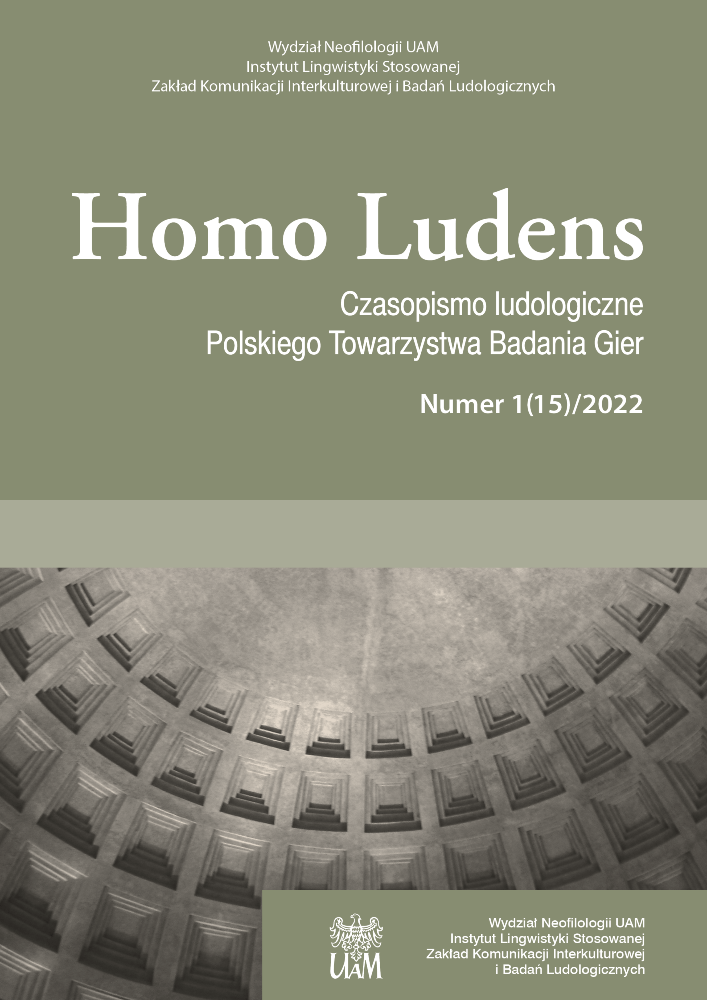Abstrakt
Niniejszy tekst omawia strategie stosowane w średniowiecznej grze fabularnej (RPG) Kingdom Come: Deliverance (2019) w procesie przekazywania i kontekstualizacji wiedzy światotwórczej (ang. lore), czyli wiedzy na temat tła i kontekstu historycznego. Strategie te są porównywane ze strategiami stosowanymi w pseudośredniowiecznej grze fantasy The Elder Scrolls V: Skyrim (2011). Artykuł przedstawia tezę, iż Kingdom Come aktywnie dąży do podkreślenia statusu historycznego swojej treści, budując wrażenie historycznej klarowności, a tylko w rzadkich przypadkach zwracając uwagę na niepewności historyczne. Tymczasem Skyrim prezentuje wiedzę w bardziej zniuansowanej formie, igrając z ideą historyczności i jak gdyby zaznaczając ograniczenia historycznych procesów poznawczych.
Bibliografia
Bártfai, I. (2018, February). Cumans in Kingdom Come: Deliverance. Medievalists.net. Online: <https://www.medievalists.net/2018/02/cumanskingdom-come-deliverance>. Date of access: 29 December 2021.
Bogost, I. (2007a). Persuasive Games: The Expressive Power of Videogames. Cambridge: The MIT Press. DOI: https://doi.org/10.7551/mitpress/5334.001.0001
Bojo, O., Bigas, J., & Princ, Z. (2021, February 21). Deliverance: The making of Kingdom Come. DENPozitiva. Online: <https://www.youtube.com/watch?v=gyrR37s-N5Q>. Date of access: 17 November 2021.
Copplestone, T. J. (2017). But that’s not accurate: The differing perceptions of accuracy in cultural-heritage videogames between creators, consumers and critics. Rethinking History, 21(3), 415–438. DOI: https://doi.org/10.1080/13642529.2017.1256615
DOI:10.1080/13642529.2017.1256615 DiPietro, M. (2014). Author, text, and medievalism in The Elder Scrolls. In D. T. Kline (Ed.), Digital gaming reimagines the Middle Ages (pp. 202–213). New York: Routledge.
Eco, U. (1987). Dreaming of the Middle Ages. In U. Eco, Travels in Hyperreality (pp. 61–72). London: Picador. DOI: https://doi.org/10.2307/40142717
Ferrari, S. (2010). The Judgment of Procedural Rhetoric. Unpublished master’s thesis. Atlanta: Georgia Institute of Technology.
Genette, G. (1997). Paratexts: Thresholds of Interpretation. Cambridge: Cambridge University Press.
Grayson, N. (2018, February 3). Kingdom Come owes its popularity to “realism” and conservative politics. Kotaku. Online: <https://kotaku.com/kingdom-come-owes-its-popularity-to-realism-and-conserv-1823420208>. Date of access: 17 November 2021).
Jenkins, H. (2004). Game design as narrative architecture. In N. Wardrip-Fruin & P. Harrigan (Eds.), First person: New media as story, performance, and game (pp. 118–130). Cambridge: The MIT Press.
Johnson, M. R. (2020). The place of culture, society, and politics in video game world-building. In M. J. P. Wolf (Ed.), World-builders on worldbuilding: An exploration of subcreation (pp. 110–131). Abingdon: Routledge. DOI: https://doi.org/10.4324/9780429242861-7
Kingdom Come: Deliverance (n.d.). Online: <https://www.kingdomcomerpg.com>. Date of access: 20 June 2022.
Kingdom Come: Deliverance (2018). Steam. Online: https://store.steampowered.com/app/379430/Kingdom_Come_Deliverance>. Date of access: 20 June 2022.
Kingdom Come: Deliverance (2019). Kickstarter. Online: <https://www.kickstarter.com/projects/1294225970/kingdom-come-deliverance>. Date of access: 20 June 2022.
Kochanowicz, R. (2014). Fabularyzowane gry komputerowe w przestrzeni humanistycznej: Analizy, interpretacje i wnioski z pogranicza poetyki, aksjologii, dydaktyki literatury. Poznań: Wydawnictwo Naukowe UAM.
Let’s Play History (18 January 2018). The most “authentic” historical game of all time?! The enormous inclination of “Kingdom Come: Deliverance”.
Let’s Play History. Online: <https://lepetitcapo.wordpress.com/2018/01/13/das-authentischste-historienspiel-aller-zeiten-die-gewaltige-schraeglage-von-kingdom-come-deliverance/>. Date of access: 16 November 2021.
Maj, K. M. (2015). Allotopie: Topografia światów fikcjonalnych. Kraków: Universitas.
Maj, K. M. (2019). Światotwórstwo w fantastyce. Od przedstawienia do zamieszkiwania. Kraków: Universitas.
Majewski, J. (2018). “The Elder Scrolls V”: Skyrim and its audience as a worldbuilding benchmark for indigenous virtual cultural heritage. Unpublished doctoral thesis. Gold Coast: Bond University.
Majewski, J. (17 June 2021). Książki jako narzędzie konstruowania światów wirtualnych na przykładzie serii gier fabularnych “The Elder Scrolls”. Paper presented at the conference “Pismo – Kultura – Technologie”, Warsaw University, Warsaw.
Majewski, J., & Bielińska-Majewska, B. (2018, October 9). Video games for the Palaeolithic: A case study of Echo: Secrets of the Lost Cavern. Article presented at the conference Interactive Pasts II, The Netherlands Institute for Sound and Vision, Hilversum. Online: <https://www.youtube.com/watch?v=cgm9YfWmqz0>. Date of access: 20 June 2022.
McCarter, R. (2 March 2018). Kingdom Come: Deliverance – Myth-making and historical accuracy. Unwinnable. Online: https://unwinnable.com/2018/03/02/deliverance-myth-making-and-historical-accuracy/>. Date of access: 17 November 2021.
Mochocki, M. (2021). Role-play as a heritage practice. Abingdon: Routledge. DOI: https://doi.org/10.4324/9781003130956
Pfister, E. (2019). Kingdom Come: Deliverance. A Bohemian forest simulator. Gamevironments, issue 11, 142–148.
Taylor, L. (2018, February 7). Kingdom Come: Deliverance still fails to deliver representation. New Normative. Online: <http://newnormative.com/2018/02/07/kingdom-come-deliverance-still-fails-deliverrepresentation/>. Date of access: 29 December 2021.
Vavra, D. (2018, May 25). Designing historical open world RPG. Digital Dragons (YouTube Channel). Online: <https://www.youtube.com/watch?v=puXwyIDCQCg>. Date of access: 7 June 2017.
Warhorse Studios (12 February 2021). Fechtbuch: The real swordfighting behind Kingdom Come. Warhorse Studios (YouTube Channel). Online: <https://www.youtube.com/watch?v=yxsNZ7XD_jQ>. Date of access: 17 November 2021.
Webster, A. (2018, February 2). Kingdom Come: Deliverance is an RPG that trades fantasy for historical accuracy. The Verge. Online: <https://www.theverge.com/2018/2/2/16964080/kingdom-come-deliverancehistory-rpg-ps4-xbox-pc>. Date of access: 17 November 2021.
White, W. J. (2014). The right to dream of the Middle Ages: Simulating the medieval in tabletop RPGs. In D. T. Kline (Ed.), Digital gaming reimagines the Middle Ages (pp. 15–28). New York: Routledge.
Wolf, M. J. P. (2012). Building imaginary worlds: The theory and history of subcreation. New York: Routledge.
Wolf, M. J. P. (2020). Appendix: Types of world-building. In M. J. P. Wolf (Ed.), World-builders on world-building: An exploration of subcreation (pp. 143–148). Abingdon: Routledge. DOI: https://doi.org/10.4324/9780429242861
Wright, A. (2020). Honour, deliverance, legacy: Representations of the Middle Ages in digital gaming. Unpublished master’s thesis. Huddersfield: University of Huddersfield.
Bethesda Game Studios (2011). The Elder Scrolls V: Skyrim [multiplatform]. Bethesda Softworks, USA.
CD Projekt Red (2015). The Witcher 3: Wild Hunt [multiplatform]. CD Projekt, Poland.
Kheops Studios (2005). Echo: Secrets of the Lost Cavern [PC]. The Adventure Company, Canada.
Origin Systems (1990). Ultima VI: The False Prophet [PC]. Origin Systems, USA.
Warhorse Studios (2018). Kingdom Come: Deliverance [multiplatform]. Deep Silver, Austria.
Licencja

Utwór dostępny jest na licencji Creative Commons Uznanie autorstwa – Użycie niekomercyjne – Bez utworów zależnych 4.0 Międzynarodowe.
Szczegółowe informacje dotyczące prawa autorskiego zawarte są w umowie podpisywanej między wydawcą a autorem.
